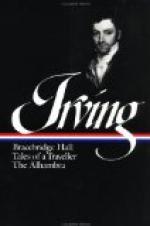Well, as I was saying, she perceived one of the eyes of the portrait move. So strange a circumstance, as you may well suppose, gave her a sudden shock. To assure herself cautiously of the fact, she put one hand to her forehead, as if rubbing it; peeped through her fingers, and moved the candle with the other hand. The light of the taper gleamed on the eye, and was reflected from it. She was sure it moved. Nay, more, it seemed to give her a wink, as she had sometimes known her husband to do when living! It struck a momentary chill to her heart; for she was a lone woman, and felt herself fearfully situated.
The chill was but transient. My aunt, who was almost as resolute a personage as your uncle, sir, (turning to the old story-teller,) became instantly calm and collected. She went on adjusting her dress. She even hummed a favorite air, and did not make a single false note. She casually overturned a dressing box; took a candle and picked up the articles leisurely, one by one, from the floor, pursued a rolling pin-cushion that was making the best of its way under the bed; then opened the door; looked for an instant into the corridor, as if in doubt whether to go; and then walked quietly out.
She hastened down-stairs, ordered the servants to arm themselves with the first weapons that came to hand, placed herself at their head, and returned almost immediately.
Her hastily levied army presented a formidable force. The steward had a rusty blunderbuss; the coachman a loaded whip; the footman a pair of horse pistols; the cook a huge chopping knife, and the butler a bottle in each hand. My aunt led the van with a red-hot poker; and, in my opinion, she was the most formidable of the party. The waiting maid brought up the rear, dreading to stay alone in the servants’ hall, smelling to a broken bottle of volatile salts, and expressing her terror of the ghosteses.
“Ghosts!” said my aunt resolutely, “I’ll singe their whiskers for them!”
They entered the chamber. All was still and undisturbed as when she left it. They approached the portrait of my uncle.
“Pull me down that picture!” cried my aunt.
A heavy groan, and a sound like the chattering of teeth, was heard from the portrait. The servants shrunk back. The maid uttered a faint shriek, and clung to the footman.
“Instantly!” added my aunt, with a stamp of the foot.
The picture was pulled down, and from a recess behind it, in which had formerly stood a clock, they hauled forth a round-shouldered, black-bearded varlet, with a knife as long as my arm, but trembling all over like an aspen leaf.
“Well, and who was he? No ghost, I suppose!” said the inquisitive gentleman.
“A knight of the post,” replied the narrator, “who had been smitten with the worth of the wealthy widow; or rather a marauding Tarquin, who had stolen into her chamber to violate her purse and rifle her strong box when all the house should be asleep. In plain terms,” continued he, “the vagabond was a loose idle fellow of the neighborhood, who had once been a servant in the house, and had been employed to assist in arranging it for the reception of its mistress. He confessed that he had contrived his hiding-place for his nefarious purposes, and had borrowed an eye from the portrait by way of a reconnoitering hole.”




